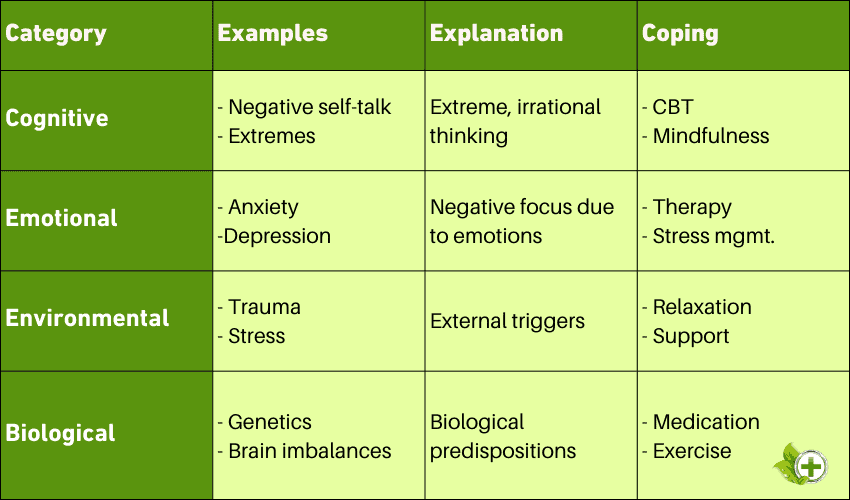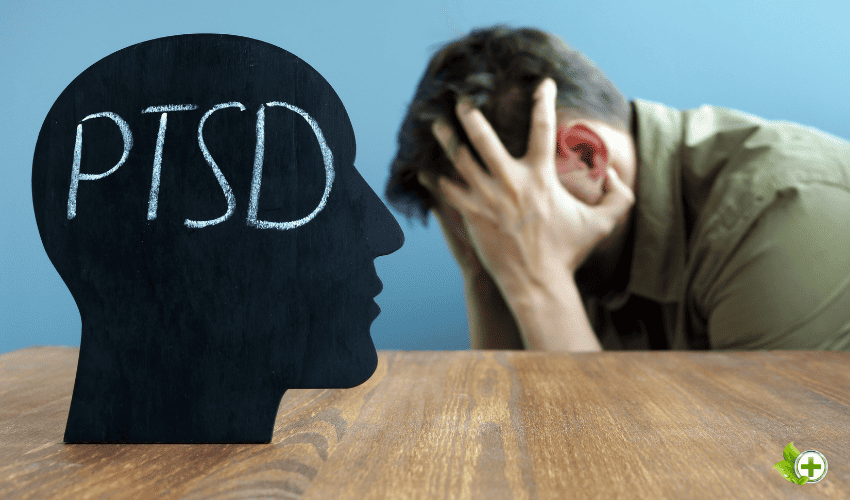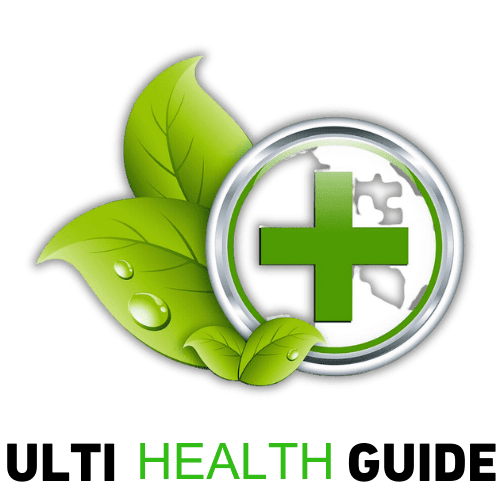Quick Reference
What is Catastrophic Thinking?
Catastrophic thinking is automatically assuming the worst possible outcome in any given situation. Catastrophic thinking can be very damaging because it can cause a lot of anxiety and stress. It can also lead to problems in relationships and work performance, as well as cause physical health problems.
Causes of Catastrophic Thinking
- A history of painful experiences
- A history of trauma or abuse
- A family history of pain or trauma
- Certain personality traits, such as being perfectionistic or having low self-esteem
Physical and Psychological Conditions Linked To Catastrophic Thinking
- Catastrophizing And Anxiety
- Catastrophizing And Depression
- Catastrophizing and Panic Disorder
- Catastrophizing And Post-traumatic Stress Disorder
- Catastrophizing and Obsessive-compulsive disorder
- Catastrophizing and Chronic Pain
Signs And Symptoms Of Catastrophizing
- You consistently think about the worst possible outcome of a situation
- You feel like you are in constant danger
- You can not face a traumatic event like others
- You have a hard time enjoying your life because you are always worried about what could go wrong
- You avoid people, places, and things that you think could be dangerous
- You have difficulty concentrating or focusing on anything other than your fear
- You are always on edge and feeling stressed
- You may feel like you are going crazy because of the way your mind is constantly racing
catastrophic thinking disorder is when something terrible will turn into a colossal disaster, even if it's not true. This kind of thinking can make us feel nervous and worried and make it hard to do our everyday stuff.
In this article, we will talk more about this way of thinking, find out if it's a sickness, and look at ways to help make it better.
What is catastrophic thinking?
Catastrophic thinking is when someone thinks something terrible will be a colossal disaster, even if it's false. It worries people and can stop them from doing everyday things. When someone keeps thinking about the worst things that can happen repeatedly, it's called "catastrophizing."
Sometimes, believing the worst can be helpful, like when we're getting ready for big storms or emergencies—it makes us prepare in case. But other times, it's not good at all. It's like when people get super scared about things that aren't dangerous, and they can't stop feeling nervous or upset.
Examples of catastrophizing
Catastrophizing means thinking that something is much worse than it is. This kind of thinking can happen with small stuff, like a kid worrying too much about a test, thinking they'll fail, and being too scared to study or even take it.
But catastrophizing can also happen with big stuff. If an individual loses their job, that person might start to think scary thoughts. They might worry they'll never find another job, lose their home, or be unable to care for their family. Such thoughts can make the individual feel scared and even have a panic attack, where their heart beats super fast, and it's hard to breathe.
So, whether it's something small or something big, catastrophizing can make people feel way more scared and worried than they need to be.
Is catastrophic thinking a disorder?
Catastrophic thinking isn't a sickness, but it can be a sign that someone might have other mental health problems, like feeling worried or having scary thoughts after something terrible happens (anxiety or PTSD).
Thinking scary and negative thoughts can be a part of different mental health problems. That's why doctors and therapists try to help people stop thinking this way, to make them feel better and happier inside their minds.

Causes of catastrophic thinking
CTD roots itself in various factors. Crippling anxiety is one of the prominent culprits, where the mind spirals into a whirlpool of negative anticipations. Anxiety is often fueled by an inability to manage stress and the persistent feeling of impending doom.
Another underlying factor is codependency. When individuals lean too heavily on others for emotional support, it breeds an environment ripe for catastrophic thoughts. In fact, A book called "Understanding and Treating Fear of Pain" says that people who often think the worst (catastrophizing) are usually also very scared of pain. There are some reasons why people might become afraid of getting hurt.
- A history of painful experiences
- A history of trauma or abuse
- A family history of pain or trauma
- Certain personality traits, such as being perfectionistic or having low self-esteem
"Anxiety and catastrophic thinking are partners in crime, feeding off each other in a dance of despair."
Is catastrophizing common?
If you often think scary or bad thoughts, it's okay - many people do, too. A study showed that about 84 out of 100 people sometimes think negative things repeatedly.
This study also found that people who often think the worst might feel sad or worried more often and try to avoid things that make them feel that way. So, you're not alone, and many people think the same way.
Physical and psychological conditions linked to catastrophic thinking
As we mentioned before, catastrophic thinking is not a mental illness. It is instead a symptom of other mental health conditions. Catastrophic thinking links to conditions such as;
- Anxiety disorders
- Depressive disorders
- Panic Disorder
- Post-traumatic stress disorder
- Obsessive-compulsive disorder
- Chronic pain

Catastrophizing and anxiety
Catastrophizing is a significant regression factor for anxiety. This means that catastrophizing can predict anxiety. The study found that the more irrational beliefs a person had, the more likely they were to experience anxiety.

Catastrophizing and depression
Catastrophizing is a significant predictor of depression in chronic pain patients; this means that if you are catastrophizing, you are more likely to experience depression. And if you'd like to learn more about depression, read Depression Explained.

Catastrophizing and panic disorder
Catastrophizing is when someone thinks that normal feelings in their body are signs of something terrible about to happen, even when they're okay.
People with panic disorder often experience this thinking, which means they can get terrified and have a panic attack.
A panic attack can make you feel like your heart is racing and it's hard to breathe. We aren't exactly sure why some people get panic disorder, but having many scary thoughts might be why it happens and continues.

Catastrophizing and post-traumatic stress disorder
Research has revealed that individuals who regularly catastrophize are more likely to experience PTSD symptoms and increased pain severity. For instance, researchers found that firefighters who believed exposure to fires would be catastrophic likely experienced more severe symptoms of PTSD following actual exposure than those with less negative appraisals.
The same journal article says that "catastrophic thinking may increase PTSD symptoms by interfering with fear extinction." This statement means that individuals who catastrophize may have more difficulty overcoming their fears.
Note: If you want to know more about PTSD, we recommend reading Is PTSD A Disability?

Catastrophizing and obsessive-compulsive disorder
A study looked at how thinking the worst (that's called catastrophizing) is related to OCD, a condition where people have thoughts that won't go away (obsessions) and feel they have to do certain things over and over (compulsions). The study found that people who often think the worst are more likely to have OCD.
So, if someone often thinks super negative or scary thoughts, they might also have trouble with these sticky thoughts and feel like they have to do certain things repeatedly to feel okay.

Catastrophizing and chronic pain
There's something called "pain catastrophizing," which means thinking that pain will be way worse than it is. Studies have shown that people who do this often feel more pain and have a more challenging time doing the usual stuff if they have long-lasting pain.
These people tend to think negatively about their pain, feel like they can't do anything to improve it, and take longer to get better. So, thinking in extreme, negative ways can make your mind and body feel worse.
Signs and symptoms of catastrophizing
If you catastrophize, you may experience some of the following signs and symptoms:
- As observed in high-functioning anxiety, an individual may appear normal but is constantly plagued by worry.
- You feel like you are in constant danger
- You can not face a traumatic event like others
- You have a hard time enjoying your life because you are always worried about what could go wrong
- You avoid people, places, and things that you think could be dangerous
- You have difficulty concentrating or focusing on anything other than your fear
- You are always on edge and feeling stressed
- You may feel like you are going crazy because of the way your mind is constantly racing
- If you often ask, “Why am I so emotional?” it might be a signal of underlying catastrophic thoughts.
If you are experiencing any of these signs and symptoms, it is important to seek professional medical advice. Catastrophic thoughts can be a symptom of other mental health conditions and can be very debilitating. They can have severe consequences if left untreated, such as job loss, relationship problems, and even suicide. Please call the National Suicide Prevention Lifeline if you are in crisis at 988 or chat with them online.
The Role of Diet and Supplements
Believe it or not, what you consume can either fuel or mitigate CTD. For example, too much Vitamin B12 can exacerbate anxiety. On the flip side, the lack of certain nutrients can lead to Vitamin D deficiency and neurological symptoms, including increased anxiety and catastrophic thinking.
Can Melatonin Make You Anxious?
Many seek solace in supplements like melatonin to combat sleep issues. However, it’s essential to ask: can melatonin make you anxious? Striking a balance is crucial to ensure that the remedy doesn’t become another trigger for CTD.

Treatment options for catastrophic thinking
There are a few different ways that catastrophic thinking can be treated.
Cognitive-behavioral therapy
There's a way to help fix the problem of thinking scary or negative thoughts too much. Cognitive-behavioral therapy is an exceptional approach where a therapist works with individuals to change how they feel and act.
Experts say that this kind of therapy can help people about to have surgery feel less scared about the pain and better overall.
In this therapy, you learn to notice your scary or negative thoughts and change them into positive ones. It also teaches you good ways to handle your feelings and worries. So, it's like a tool kit for your mind to make you feel better!
Exposure therapy
There's another way to help people who always think the worst: exposure therapy. Recent research shows that this method is good at helping people with a pain condition called fibromyalgia to stop being scared of their pain.
In exposure therapy, people get the chance to face their fears but in a way that's safe and controlled. It helps people see that their fears aren't as scary as they thought and that they can handle them. It's like practicing bravery in a safe place, so when fearful thoughts come, you know you can manage them!
Medication
There are also medication options that can help treat distorted thinking. These include antidepressants, anti-anxiety medications, and beta blockers. These medications can help to reduce your anxiety and help with your irrational fear.
The Role of Nutrition and Physical Health
An often overlooked yet crucial component of healing is nutrition and physical health. Anxiety and stress, common in catastrophic thinking disorder, can be significantly influenced by dietary habits. For instance, the correlation between gut health and mental wellness is undeniable. Understanding how alcohol kills gut bacteria and affects mental health is essential.
Likewise, exploring and learning about flavonoid supplements can offer natural remedies to enhance mental well-being, providing the body with the necessary tools to combat anxiety and stress.
Sleep's Undeniable Influence
Quality sleep is another cornerstone in the foundation of healing. Is "6 hours of sleep enough?" unveils the overlooked aspects of sleep's impact on mental health. Proper sleep hygiene isn't just about quantity but quality, and its intricate connection with mental health can't be overstated.
How do you stop catastrophizing thoughts?
Other than seeking professional help, here are a few things that you can do to stop catastrophizing:
- Practice mindfulness: Mindfulness is about paying attention to the present moment. Doing mindfulness can help you stop thinking scary thoughts and bring you back to what's happening.
- Identify your triggers: Pay attention to the specific situations or thoughts that make you think negatively. You can prepare for them or try to avoid them when you know what they are.
- Challenge your thoughts: When you have an irrational thought, try to challenge it. Consider whether there is any proof to back up the thought. If not, try reframing the thought in a more positive light.
- Practicing relaxation techniques: Doing things like deep breathing and meditation can make you feel calmer and help stop scary thoughts before they start.
- Seek professional help: If you struggle to stop your negative thoughts alone, seek professional help. A therapist can help you to identify and change your thinking patterns.
Conclusion
Catastrophic thinking can be a very debilitating condition. If you are struggling to stop your negative thoughts, you need to seek professional help. Various treatment options are available to reduce negative thinking and improve your quality of life. You can learn to manage your thoughts in worst-case scenarios healthily with the proper treatment and improve your mental health.
FAQ
What Is Catastrophic Thinking A Symptom Of?
Catastrophic thinking is a symptom of anxiety disorders, post-traumatic stress disorder, and depression. As mentioned above, it can also be a symptom of other mental illnesses.
Is Catastrophic Thinking OCD?
Catastrophic thinking can be a symptom of OCD, but it is not the same thing. Catastrophic thinking is when you have negative thoughts about a situation that is not actually dangerous. OCD is when you have compulsions, or repetitive behaviors, that you feel you need to do in order to avoid a feared situation
References
- Anxiety Disorders: Chapter 6
- Pubmed: Understanding Pain Catastrophizing: Putting Pieces Together
- Pubmed: Catastrophic Thinking: A Transdiagnostic Process Across Psychiatric Disorders
- Oxford University Press: Understanding and Treating Fear of Pain
- Pubmed: Repetitive Negative Thinking
- Eric: Irrational Beliefs, Anger, and Anxiety
- Pubmed: Relation between catastrophizing and depression in chronic pain patients
- Pubmed: Catastrophic misinterpretation of bodily sensations and external events in panic disorder
- Pubmed: Predicting posttraumatic stress disorder symptoms and pain intensity following severe injury: the role of catastrophizing
- Pubmed: The relationship between cognitions and symptoms in obsessive-compulsive disorder
- Pubmed: Pain catastrophizing: a critical review
- Pubmed: Preoperative cognitive-behavioral therapy for reducing pain catastrophizing
⚠️Disclaimer: The information provided on this health blog is for informational purposes only and is not intended as a substitute for professional medical advice, diagnosis, or treatment. Always seek the advice of your physician or other qualified health provider with any questions you may have regarding a medical condition.





